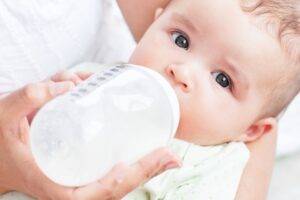The choice to breastfeed or formula-feed your baby could be one of the major decisions new mothers will make. As health experts say, breast milk is the best nutritional choice for infants. Hence, the benefits of breastfeeding couldn’t be stressed enough.
Unfortunately, breastfeeding isn’t possible for all women. Formula feeding is a healthy alternative for mothers who can’t breastfeed or decide not to. The milk formula provides the nutrients babies need to grow and thrive.
Many factors are considered when deciding which to choose between the two methods. Both have their benefits and a share of challenges too; hence, the decision is wholly a personal one. As a new mom, weighing the pros and cons helps greatly in drawing up your choice.
We at Omega Pediatrics will delve into this topic, hoping to help new moms navigate their decision-making journey regarding feeding their little ones.
The Benefits and Pros of Breastfeeding
Nothing beats breastfeeding as the best choice for infants. Health experts and medical organizations—the American Academy of Pediatrics (AAP), the American Medical Association (AMA), and the World Health Organization (WHO)—assert this.
Furthermore, the AAP recommends exclusive breastfeeding for the first six months. Beyond this, the organization also encourages this method for at least a year and longer until both the mother and baby are willing.
-
Provides the ideal nutrition.
Breastmilk serves as complete nourishment for an infant. It contains the essential elements, such as protein, lactose, and fats, that are in the correct amounts and proportions ideal for the baby’s nutritional needs.
The breastmilk components are perfect for the infant’s gut system since they’re easily digestible by a newborn. Hence, babies have fewer bouts of diarrhea or constipation. Except for vitamin D, breast milk also contains vitamins and minerals.
The US Food and Drug Administration regulates formula companies to provide all the necessary nutrients, including vitamin D, in their formula products. Yet still, commercial formulas can’t match breastmilk’s exact composition.
No process can compare to the natural production of breastmilk by a mother for her child.
-
Strengthens babies’ immunity.
Breastmilk contains antibodies, so your baby has natural immunity from a long list of infectious diseases such as diarrhea, meningitis, ear infections, and respiratory infections. Sudden infant death syndrome (SIDS) is also included.
Not only through breastmilk, but antibodies can be transmitted from the mother to her baby. Chronic ailments such as asthma, obesity, and diabetes are also less likely to develop.
-
Fosters bonding.
This builds confidence in the mother’s ability to care for her baby. There’s skin-to-skin contact, which paves the way for an emotional connection between them. Nursing moms enjoy the experience of bonding closely with their babies.
-
Babies easily adapt to different tastes.
Nursing moms need 300–500 extra calories daily from their balanced diet. In effect, this introduces their babies to different tastes through their breastmilk, which has different flavors. The result is that breastfed babies can easily transition to solid foods.
-
Cost-saving and convenience.
There will be no grocery runs for milk anymore. Breastmilk will always be fresh and available, giving great economic savings. Plus, there are tons of conveniences.Breastmilk is always at the right temperature and no preparation is needed—that is, mixing or knowing the right proportions. There’s also no warming up of milk in every feeding session.
Unless you need a breast pump, there’s no need for bottles, nipples, and other supplies that entail cost. Also, you enjoy the convenience of fewer household chores, such as routinely washing bottles, nipples, bottle and nipple brushes, and warming up bottles.
More importantly, since breastfed babies are less likely to get sick, this means fewer trips to the doctor, laboratory, and hospital admissions, fewer expenses for medications and prescriptions, and all other related costs and inconveniences.
-
Begets smart children.
Breastmilk is instrumental in the baby’s brain growth and development. Research has shown that breastfed children have higher IQs and perform well in school and academics.
-
Beneficial for the mother.
Nursing moms have a sense of security since their baby’s food source is ascertained. Also, it helps them lose weight easily after giving birth. Studies have shown that it lowers the risk of high blood pressure, diabetes, and cardiovascular diseases.
Lactation burns calories quickly and helps with uterine contractions. This enables mothers to return to their pre-pregnancy shape and weight quicker. There are other health benefits, such as a reduced risk of breast, uterine, and ovarian cancers.
The Challenges and Cons of Breastfeeding
Breastfeeding can be easy for some mothers, but it may not be a good option for others. Nursing mothers and their babies take a lot of patience to get used to the feeding routines.
-
Not enough breastmilk.
This is probably the most common reason, often due to inadequate lactation education or a lack of support from family and friends. Expectant moms need to be mentally and physiologically prepared for a positive experience.
-
Latching problems.
Some mothers are uncomfortable, or even endure pain, during feeding. The baby has trouble latching, thus becoming irritable. This could be the result of a lack of practice or insufficient information on proper latching.
A healthcare specialist, a lactation consultant, a midwife, or nursery staff could offer timely support and guidance to address the problem.
-
Frequency of feeding.
This feeding option demands the mother’s time commitment. Especially during the early months, you need to be around every 2 or 3 hours for feeding time. This isn’t desirable for full-time working moms, or just simply running errands or traveling.
This setup can be stressful for both mother and baby since they’ll have to find other ways to bond over feeding time without the physical contact that breastfeeding provides.
-
Diet and self-care.
As a nursing mom, you should be careful about what you eat and drink since these affect your breast milk. Fish with a high mercury content and alcohol are avoided. Also, limit caffeine intake, which causes restlessness and irritability in babies.
Some mothers are keen on self-care postpartum. They think that lactating might result in an unpleasant body shape and image. They would prefer to pump the breast milk and feed it to the baby using a bottle instead of having the baby nurse directly.
-
Maternal health.
There are medical conditions that make this method unsafe, such as HIV and AIDS or chemotherapy treatment. Also, some medications are unsafe; you need to secure prior clearance from your doctor.
The Benefits and Pros of Formula Feeding
While breastfeeding is the best choice for mothers who want to provide their babies with the best nutrition, formula feeding is also a healthy option and a suitable alternative to breastmilk. Some mothers choose not to breastfeed due to various reasons.
-
Flexibility and convenience.
Bottle feeding allows others to participate in feeding, offering greater flexibility and convenience. You need not be physically present at every feeding session, which is particularly beneficial for working moms. You need not be where your baby is.
There are still other conveniences with bottle feeding. You don’t need to schedule work and other obligations around the baby’s feeding session. Also, you don’t need to go to a private place to feed the baby.
-
Bonding with other family members.
Mothers may no longer be the key persona in every feeding session; the father and other family members may share the feeding duties; hence, they will have the opportunity to bond with the baby by taking turns bottle-feeding.
Especially for fathers, they get more involved in the crucial feeding process.
-
Maternal diet.
While bottle-feeding, you will have no worries about what to eat and drink concerning your baby. Your diet will have no direct impact on the baby.
-
Certainty and control.
You can ascertain the quantity of milk your baby consumes with each feeding. This is especially beneficial in certain situations.
-
Self-care and social pressure.
With bottle-feeding, you can focus on your self-care postpartum. With other people who can take charge of your baby’s feeding, you will have more time for breaks from infant care, thus giving you more time to care for yourself, too.
For new mothers, especially the very young, there’s a sense of belonging since that’s what they see celebrities do on social media and television.
The Challenges and Cons of Bottle-Feeding
-
Lack of immunity.
Manufactured milk formula doesn’t contain the antibodies that breast milk has. Hence, your baby needs added protection against infections and illnesses. Work closely with your child’s healthcare provider to take care of this.
-
Risk of gas and constipation.
Formula-fed babies have a higher likelihood of developing gas and firm bowel movements. Consult with your child’s pediatrician, who can prescribe medications to alleviate these symptoms.
-
Expense.
Milk formula is costly; hence, it takes a big chunk off the family’s budget. Also, special milk formulas are required for certain medical conditions, that are determined by the pediatrician. Specialty milk formulas, such as soy and hypoallergenic, cost far more.
-
Planning and preparation.
You need to do careful planning to work around your baby’s feeding. Monitor how much milk your baby needs and ensure that milk formula is available at the time you need it. As your baby ages by weeks and months, the milk requirement also increases.
Additionally, ensure you have the needed supplies, such as bottles and nipples, clean and accessible to answer your fussy baby when hungry. Babies have 8–10 feedings round-the-clock; hence, it’s important to have everything ready.
Equally important is the preparation of milk formula. Ensure that everyone involved in feeding your baby is well-versed in the preparation, the mixing proportions, and the hygienic means. All these require planning as part of caring for your baby.
Make a Choice: Breastfeed or Bottle-feed

Nursing is a wonderful experience for both the mother and the baby. Aside from the ideal nourishment the baby receives, it affords a special bond that any mother could cherish. You could choose how to feed your baby—breastfeed or bottle-feed.
Breastfeeding can be difficult if you have a full-time job or other children to care for. Bottle feeding can be more convenient, but it may not provide the same benefits as breastfeeding. You may need to weigh other factors between the two methods.
In the end, the choice between breastfeeding and bottle-feeding is a personal one. Choose what works best for you and your baby based on your comfort level, lifestyle, and certain medical conditions.
What’s most important is that your baby is well-fed, cared for, and loved, regardless of whether you choose breastfeeding, formula feeding, or a combination of both. Your child’s pediatrician is your perfect partner to give you proper guidance.
We at Omega Pediatrics would be glad to help you navigate this crucial process of feeding your little one. We are your perfect ally when it comes to your baby’s healthcare needs and your maternal health as well. Come book an appointment with us.



